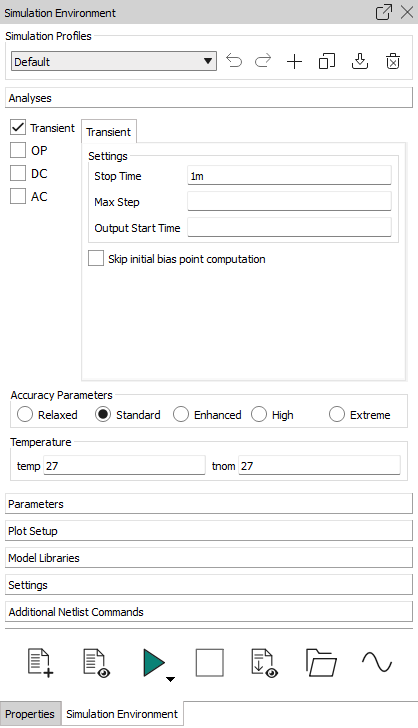Defining simulation profiles
Simulation profiles let you store settings that you commonly use. They can be recalled simply by choosing them from the Simulation Profiles menu.
Creating a simulation profile for the low pass filter
Define the profile in the Simulation Environment, which is initially displayed on the right side of the design environment
If you switched to the
Properties
tab while drawing the schematic, you have to switch back to it by clicking on
Simulation Environment
on the bottom right of the
InfineonSpice
design environment.

At the top, the
Simulation Environment
consists of the following items:
Drop down-menu which allows to switch between different simulation profiles
Undo/Redo to revert changes in simulation profiles
Button to add new simulation profiles
Button to copy simulation profiles
Button to import a simulation profile from another schematic
Button to delete the currently selected simulation profile
At the center, the
Simulation Environment
has different sections which can be used to define the following:
Different circuit analysis types include Transient, OP, DC
The circuit's design parameters, for example supply voltages or transistor widths
The plot setup of the analysis, for example specific node voltages and device currents to be plotted
File paths to model libraries which contain device models used in the circuit
Simulator settings, for example accuracy parameters
Additional Netlist commands, that is, user-defined inputs in TITAN syntax
Defining simulator outputs
The simulator outputs, that is, the signals to be plotted by the waveform viewer after the successful termination of a simulation, are defined in the
Plot Setup
section of the
Simulation Environment
. By default, only
Top-Level
voltages and currents of the circuit are stored in the results data base. Signals deeper down the circuit hierarchy are not saved.
Option All allows to store all voltages and currents of the circuit, which however increases the amount of data generated by TITAN
Option Signals only causes TITAN to save only the signals specified in the Signals pane, minimizing the disk space required for saving the outputs